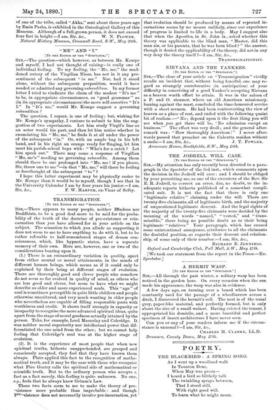" ME " AND "
[To TEE EDITOR OF THE " SPECTATOR."] Sin,—The question—which however, as between Mr. Kempe and myself, I bad not thought of raising—is really one of individual feeling. To my feeling, the "Me, me," the mad- dened outcry of the Virgilian Nisus, has not in it any pre- sentiment of the subsequent "in me." Nor, had it stood alone, without the subsequent preposition, would it have needed or admitted any governing subauditum. In my former letter I tried to vindicate the claim of the modest "It's me" to be, in appropriate circumstances, as "good grammar" as (in its appropriate circumstances) the more self-assertive "It's I." In "It's me," would Mr. Kempe suggest a governing subauditum ?
The question, I repeat, is one of feeling ; but, wishing for Mr. Kempe's sympathy, I venture to submit to him the sug- gestion of two experiments. Let him study Virgirs line as an actor .would his part, and then let him notice whether in enunciating his "Me, me," he finds it at all under the power of the subsequent "in." Or, with an ample bag in his left hand, and in his right an orange ready for flinging, let him meet his parish-school boys with : "Who's for a catch Let him speak out." There may come a response of Tirgilian "Me, me's " needing no governing subaudita. Among them -should there be one prolonged into "Me, me ! if you please, Sir, throw one to me "—in that "Me, me," will there be feeling -or forethought of the subsequent "to"?
I hope this latter experiment may be physically easier to Mr. Kempe than it would be to myself, though I see that in -the University Calendar I am by four years his junior.—I am, &c., F. W. HARPER, ex-Vicar of Selby.


































 Previous page
Previous page